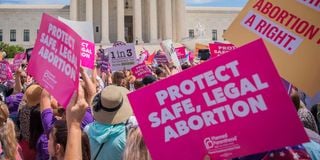Welcome to El Salvador where a miscarriage sends you to jail

Pro-life abortion protest on the steps of the Supreme Court in Washington DC, United States in 2019 after states sought to pass restrictive abortion laws. In El Salvador, there is a total ban of abortion regardless of the circumstances under which the women or girls got pregnant.
What you need to know:
- The country in Central America has laws tormenting women and girls with the harshest abortion laws under the sun.
- Should a woman abort, regardless of circumstances, the law sends them to jail for between two to eight years.
- A19-year-old woman who miscarried after a rape ordeal was charged with aggravated homicide-intentional and premeditated killing of another person - and jailed for 30 years.
A woman is raped and she conceives. She, however, cannot bear to carry the child and opts for abortion. Alternatively, she carries the pregnancy but suffers a miscarriage.
The government gets wind of it, arrests the woman, and throws her to jail for decades for the abortion or miscarriage.
Welcome to El Salvador, a country in Central America tormenting women and girls with the harshest abortion laws under the sun. Here, there is a total ban on abortion. Notwithstanding the circumstances under which the women or girls got pregnant.
Previously, under the 1956 Penal Code, abortion was allowed to save the life of a woman. But the 1997 draft bill by the Nationalist Republican Alliance introduced changes passed by the Legislative Assembly.
The amended Penal Code introduced no exceptions for abortion; whether a woman’s life is in danger or she is mentally tortured by the rapist’s pregnancy, she has no option but to deal with the pain and give birth to the child.
Should they abort, the law sends them to jail for between two and eight years. For medical professionals or those who force them to abort, their penalties are even harsher. They are imprisoned for four to 12 years.
However, prosecutors and judges often categorise abortion and miscarriages as “aggravated homicide”, a crime punishable by 30 to 50 years in prison.
In 2017, for instance, a 19-year-old woman who miscarried after she got raped was charged with aggravated homicide-intentional and premeditated killing of another person and sent to prison for 30 years.
This rigid law has driven many women and girls into committing suicide.
Committed suicide
In 2014, Reuters quoted Mario Soriano, a doctor who headed youth and adolescent development programme at El Salvador's health ministry, as saying hundreds of girls who became pregnant after being raped, committed suicide every year because they saw no other option.
According to the United Nations Population Fund, restricting access to abortion does not prevent people from seeking abortion, it simply makes it more deadly.
The UN sexual and reproductive health agency has a two-fold approach to abortion: preventing recourse to abortion by promoting universal access to voluntary family planning; and dealing with the consequences of unsafe abortions to save women's lives.
In Kenya, survivors of sexual violence are exempted from the abortion restriction.
Nevertheless, it’s done only if the health professional finds there is a need for emergency treatment or the life or health of the mother is in danger, as provided in the 2010 Constitution and supported by National Guidelines on Management of Sexual Violence in Kenya and Standards and Guidelines for Reducing Morbidity and Mortality from Unsafe Abortion in Kenya.
Article 158 of the Penal Code, however, punishes an individual with a 14-year jail term for being guilty of a felony arising from unlawfully assisting a woman to procure an abortion. It’s on this basis that health professionals are arrested and prosecuted.
However, in 2022, the High Court in Malindi pronounced abortion care as a fundamental right under the Constitution. It also found it illegal that patients and healthcare providers were arrested and prosecuted for seeking or offering abortion services.





